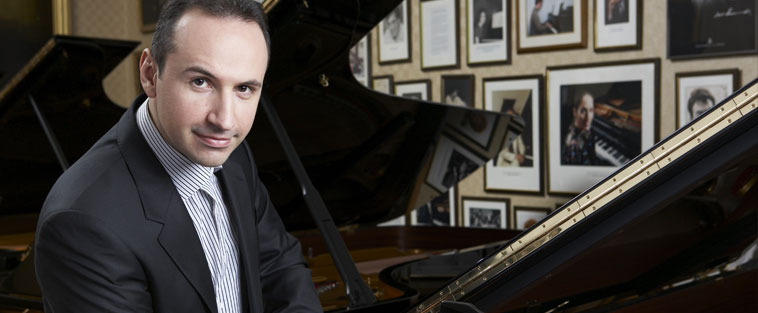By Michael Cameron
The Republic of Macedonia is among the smaller nations of Europe, so it’s not surprising that few of its musicians have reached the highest ranks in the classical music firmament. Described by The Guardian as “wondrously talented,” pianist Simon Trpčeski is the most notable exception, and Chicago audiences have been fortunate to hear his consummate artistry many times over the past decade.
In 2008, the pianist made his made his Chicago Symphony Orchestra debut in Orchestra Hall with conductor Ludovic Morlot performing the Tchaikovsky Concerto No. 1, an event he recalls with great fondness. “The CSO is one of the top orchestras in the world, and its clear, transparent, and powerful sound is a motivation for every artist. We played four concerts, and it was amazing to constantly experience the high professionalism of the musicians as well as the wonderful reaction of the audience.”
Last summer Ravinia audiences were treated to a rare doubling of concerto appearances by Trpčeski. The first was a reprise of that debut performance of the Tchaikovsky from a decade earlier, this time with maestro Dima Slobodeniouk. A mere two weeks later he was called in to substitute for Denis Matsuev in Rachmaninoff’s Rhapsody on a Theme of Paganini, with Michael Stern on the podium.
Trpčeski’s acclaimed debut recording on EMI Classics also featured works of Tchaikovsky, as well as fellow Russians Scriabin, Stravinsky, and Prokofiev. The pianist credits his principal teacher in Macedonia, the Russian émigré Boris Romanov, for instilling a deep appreciation for the idiom. “He helped me to develop a taste for Russian music, how to understand it, shape it, and direct the musical flow in the most natural way.”
The pianist has further honed his instincts through multiple collaborations with Russian conductor Vasily Petrenko and the Royal Philharmonic Orchestra, with whom he recorded the Russian concertos, including most of the works of Rachmaninoff, Prokofiev, and Tchaikovsky. Trpčeski speaks in glowing terms of their partnership. “I met Vasily in 2007 during his first season at the RPO, and we played Rachmaninoff’s First Concerto and the Rhapsody at the same concert. From our first contact, we really clicked, since we have a similar understanding of the music. I always feel an extra sense of responsibility when I play Russian music with Russian musicians. Of course, they differ from each other, but I was really glad to see that our understanding was basically the same, since we try to follow the nature and logic of the musical thought.”

Ravinia audiences will get to experience their camaraderie August 4 when they appear together for the first time in the Chicago area. They may be taking a turn to the west from the Russian works they are so renowned for, but it’s no less powerful a warhorse that they will be offering up, Grieg’s Concerto in A minor. In comparison to other works he has performed with Petrenko, Trpčeski sees a similar latitude in the music. “It certainly has some connection to Tchaikovsky deep beneath the surface. Grieg’s concerto is a perfect combination of the broad expression of Romanticism with the sheer beauty of Norway, combining the grandeur of the piano with the colorful and tasteful use of the orchestra. As in every piece of music, and particularly one so popular, one should go deep into the composer’s details in the score, to make it interesting, fresh, and alive. Knowing Petrenko, I’m sure that this will be the case in the orchestral part of the performance.”
While his concerto is the best known of Grieg’s piano works, there are many solo works that reveal a more intimate side of the composer. Trpčeski performed one of these recently, the Holberg Suite, a work more frequently heard in a version for string orchestra. “I have not played much of his solo piano music, but it certainly needs a different approach than the concerto, simply because they are different forms. But the ‘sound’ of nature in Norway is there in both.”
One might expect that at this point in his flourishing career the pianist would have settled in one of the dominant cultural capitals of Europe. But his devotion for his homeland is such that he still resides in his hometown of Skopje, raising a family in the ancient, picturesque Balkan capital. His roots are also evident in his passion for Macedonian folk music, realized most definitively by an initiative dubbed “Makedonissimo,” a program that features a collection of works for a large chamber ensemble.
“This has been one of my dreams. As I grew up with the folk music tradition of Macedonia, I always believed that it could communicate with different types of audiences. After all, the greatest composers have had considerable knowledge of their nation’s folk music and used it in their compositions. The composer Pande Shahov made the transcriptions. The depth of the songs and the intricate rhythmic figures of the dances provoke different kinds of emotions from the listeners. I hope to present it to American audiences soon.”
Shahov has also tapped into his Balkan roots with a new concerto for Trpčeski that will be premiered in Santa Cruz at the Cabrillo Music Festival the night before the Highland Park date. “I hope to not have any problems with the flight so that I can get to Ravinia on time!” ▪
Michael Cameron is a double bassist and professor of music at the University of Illinois. His writings have appeared in the Chicago Tribune, Chicago Classical Review, and Fanfare Magazine.

